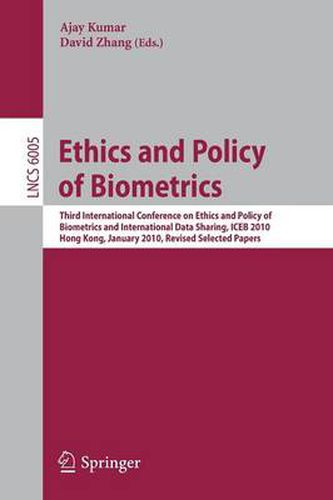Readings Newsletter
Become a Readings Member to make your shopping experience even easier.
Sign in or sign up for free!
You’re not far away from qualifying for FREE standard shipping within Australia
You’ve qualified for FREE standard shipping within Australia
The cart is loading…






This title is printed to order. This book may have been self-published. If so, we cannot guarantee the quality of the content. In the main most books will have gone through the editing process however some may not. We therefore suggest that you be aware of this before ordering this book. If in doubt check either the author or publisher’s details as we are unable to accept any returns unless they are faulty. Please contact us if you have any questions.
The past decade has seen tremendous growth in the demand for biometrics and data security technologies in applications ranging from law enforcement and immigration control to online security. The benefits of biometrics technologies are apparent as they become important technologies for information security of governments, business enterprises, and individuals. At the same time, however, the use of biometrics has raised concerns as to issues of ethics, privacy, and the policy implications of its wi- spread use. The large-scale deployment of biometrics technologies in e-governance, e-security, and e-commerce has required that we launch an international dialogue on these issues, a dialogue that must involve key stakeholders and that must consider the legal, poli- cal, philosophical and cultural aspects of the deployment of biometrics technologies. The Third International Conference on Ethics and Policy of Biometrics and Inter- tional Data Sharing was highly successful in facilitating such interaction among - searchers, policymakers, consumers, and privacy groups. This conference was supported and funded as part of the RISE project in its ongoing effort to develop wide consensus and policy recommendations on ethical, medical, legal, social, cultural, and political concerns in the usage of biometrics and data security technologies. The - tential concerns over the deployment of biometrics systems can be jointly addressed by developing smart biometrics technologies and by developing policies for the - ployment of biometrics technologies that clearly demarcate conflicts of interest - tween stakeholders.
$9.00 standard shipping within Australia
FREE standard shipping within Australia for orders over $100.00
Express & International shipping calculated at checkout
This title is printed to order. This book may have been self-published. If so, we cannot guarantee the quality of the content. In the main most books will have gone through the editing process however some may not. We therefore suggest that you be aware of this before ordering this book. If in doubt check either the author or publisher’s details as we are unable to accept any returns unless they are faulty. Please contact us if you have any questions.
The past decade has seen tremendous growth in the demand for biometrics and data security technologies in applications ranging from law enforcement and immigration control to online security. The benefits of biometrics technologies are apparent as they become important technologies for information security of governments, business enterprises, and individuals. At the same time, however, the use of biometrics has raised concerns as to issues of ethics, privacy, and the policy implications of its wi- spread use. The large-scale deployment of biometrics technologies in e-governance, e-security, and e-commerce has required that we launch an international dialogue on these issues, a dialogue that must involve key stakeholders and that must consider the legal, poli- cal, philosophical and cultural aspects of the deployment of biometrics technologies. The Third International Conference on Ethics and Policy of Biometrics and Inter- tional Data Sharing was highly successful in facilitating such interaction among - searchers, policymakers, consumers, and privacy groups. This conference was supported and funded as part of the RISE project in its ongoing effort to develop wide consensus and policy recommendations on ethical, medical, legal, social, cultural, and political concerns in the usage of biometrics and data security technologies. The - tential concerns over the deployment of biometrics systems can be jointly addressed by developing smart biometrics technologies and by developing policies for the - ployment of biometrics technologies that clearly demarcate conflicts of interest - tween stakeholders.